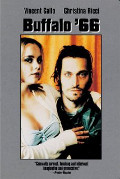
Directed by
Vincent Gallo
106 minutes
Rated MA
Reviewed by
Bernard Hemingway


Buffalo '66
Vincent Gallo’s film, which he directed and wrote with Alison Bagnall as well as playing the lead, is a gem of a black romantic comedy that most will find too perverse but those with an appetite for the mordantly offbeat will relish.
In what appears to be an at-least semi-autobiographical story Gallo plays the part of Billy Brown, hipster slacker and loser extraordinaire with an anger management issue who is on a mission to retrieve his mis-spent life after a five year stretch in a penitentiary. This principally involves deceiving his parents (played with dead-pan hilarity by Anjelica Huston and Ben Gazzara) that he’s a success, and exacting revenge on Scott Wood, the football player who Billy believes is responsible for landing him in jail after he failed to kick a crucial goal in the 1966 finals one that lost the Buffalos the big game and Billy $10,000. To get out of his debt and avoid "very bad things" being perpetrated on him by a bookie (Mickey Rourke), Billy has to take the rap for a crime he didn't commit, hence his time in the cooler.
The film opens with Billy leaving the hoosegow and in short order abducting Layla (Christina Ricci) a plump young lady in a ridiculously scanty powder blue "dress” who willingly goes along with him, apparently besotted by the boyish charm that lies beneath his oafish abuse and finding more pleasure being in his warped world than alone in hers.
The result is a marvellous mix of ironic self-pity, black (I wont say "Gallo's" I promise) humour, dire alienation and Lynchian fantasy (as for example when Ricci tap dances in the bowling alley or Billy prowls though Wood’s strip joint to the sounds of British art-rock band, Yes's "Heart Of The Sunrise"). Gallo uses a variety of unusual photographic techniques including overhead camera angles and frame-within-frame flashbacks that work well to develop the story and add to the film's idiosyncratic nature.
Want something different?





